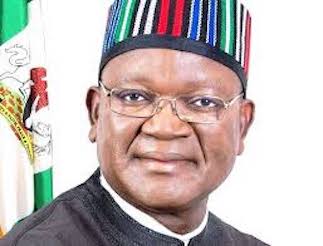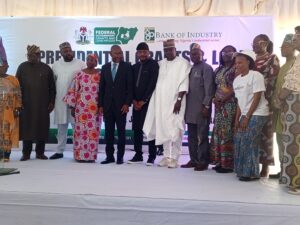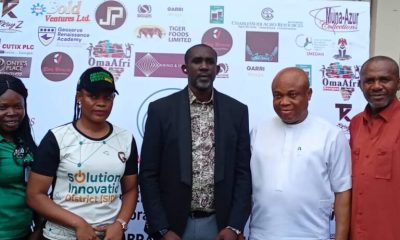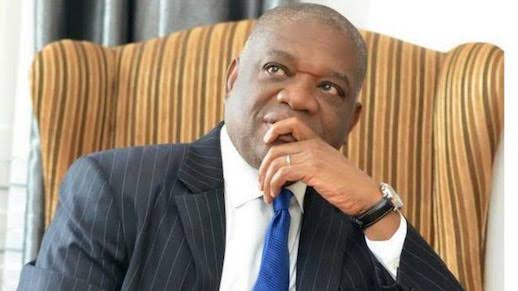Economy
Ortom Inaugurates MSMEs Policy Implementation Council

From Vincent Nyinongu, Makurdi
Benue State Governor, Samuel Ortom has inaugurated the State Council on the implementation of the national Micro, Small and Medium Enterprises, MSMEs.
Ortom who performed the inauguration ceremony Tuesday at the New Banquet Hall of Benue Peoples House Makurdi said the council was critical to building the state’s economy.
“This council is vital in harnessing efforts of Micro, Small and Medium Enterprises as critical stakeholders in building the Benue economy,” the Governor stated.
He recalled that his administration had earlier inaugurated the State Council on commercialisation and privatisation to reposition public-owned enterprises in the state that had gone comatose for years, stressing that its recommendations were being weighed by government for implementation.
The Governor stated that his administration had commenced the process of setting up a state Micro, Small and Medium Enterprises Development Agency, pointing out that the State Executive Council had already given approval to that effect and a legislation was being awaited from the State House of Assembly.
Functions of the 14-member MSME Council include provision of guidance on policies and strategies to drive the development of MSMEs subsector, fostering increased awareness, ensuring that national policy on MSMEs achieves intended goals among others.
Director General Small and Medium Enterprises Development Agency of Nigeria, SMEDAN, Dr. Dikko Umaru acknowledged Benue as one of the few states to inaugurate the council, adding that the agency under his leadership would support any worthy cause that added to MSMEs development in the state.
Chairman of the council and State Commissioner for Industry, Trade and Investment, Merga Kachina said members would justify the confidence reposed in them.
Economy
SEC to Intensify Crackdown on Ponzi Schemes

The Securities and Exchange Commission (SEC) says it will intensify efforts to eliminate Ponzi and pyramid schemes, thereby fostering an environment for genuine investment opportunities to thrive in 2025.
Dr Emomotimi Agama, the Director General of SEC, said this in his New Year message to the capital market community on Sunday.
He said that protecting investors remained a cornerstone of the commission’s mission.
Agama also said that the commission would prioritise key initiatives aimed at deepening market integrity, enhancing investor confidence
and driving economic growth.
According to him, SEC is positioned with a dual mandate in regulating and developing the capital market in Nigeria.
“Naturally, our top priority in 2025 will cut across the dual mandate. For us, mainstreaming the Nigerian Capital Market into the economy is very vital.
“Enforcement is the backbone of effective regulation. We are revamping our investigative processes to enhance efficiency and hold bad actors accountable more decisively.
“Insider trading undermines activities and dampens market fairness. By revising our regulatory framework, we aim to strengthen detection, prevention, and accountability mechanisms.
“Transparency is at the heart of investors confidence and capital markets. We will introduce measures to ensure greater visibility and trust in securities transactions,” he said.
The director-general added that to resolve market disputes efficiently and fairly, the commission was focusing on enhancing the operations of the Investments and Securities Tribunal (IST).
He noted that these efforts aim to make the tribunal more effective in delivering timely resolutions, thereby improving overall efficiency in the process.
Agama stated that key focus for the commission in 2025 is strengthening the legal framework of the commodities market to enable it attain its full potential of aiding economic development.
He said the commodities market is a major area of interest for SEC, adding that Nigeria is purely an agrarian nation.
The director-general said that taking that comparative advantage to the next level, is something that the commission is proud to be part of.
Agama said this year, SEC would focus on reinforcing the legal and regulatory structures that support growth to create a solid foundation for the vibrant commodities ecosystem, be it soft or hard commodity.
“More so, when we have a plethora of commodities all over Nigeria. SEC as a partner in development will make sure that we make the difference,” he said.
Agama said that these initiatives reflect the commission’s vision for a stronger and more inclusive capital market in 2025, adding that SEC is committed to building wealth, instilling confidence and making impacts.
The SEC boss said: “As we embark on this journey, I invite all stakeholders to work with us in achieving these goals.
“Together, we can unlock the potentials of the Nigerian capital market and make this a defining year for our economy.
“What we intend to do, is to steer the capital market towards a direction that ensures that development gets to the doorstep of every Nigerian.”(NAN)
Economy
Stockbrokers Propose Strategies to Grow $1trn Economy

Nigerian Stockbrokers have proposed strategies by which the Federal Government can deepen the capital market to achieve its proposed one trillion dollar economy.
They made the proposal in a communique signed by Mr Oluropo Dada, President/Chairman of Council of Chartered Institute of Stockbrokers (CIS), and the Registrar/Chief Executive of CIS, Dr Josiah Akerewusi.
The communique was from the 28th Annual Conference of CIS held in Ibadan with the theme: “Capital Market as Catalyst for The One Trillion Dollar Economy’’.
Dada said that, if adhered to, the proposed strategies would help the government to achieve its goal without increasing borrowing.
He urged the Federal Government to list Nigerian National Petroleum Company Ltd.
and moribund state enterprises on the secondary markets.According to him, this is to deepen the markets, enhance the companies’ ability to make profit and generate revenue for the government through tax.
The CIS president also said that there was the need to rebase Nigeria’s Gross Domestic Product (GDP) to reclaim the country’s status as Africa’s largest economy to create opportunities to achieve the one trillion dollar target.
Dada urged policies that would incentivise indigenous and privatised companies as well as Small and Meduim Enterprises (SMEs) to list on the Nigerian capital market.
He said that the informal economy constituted a significant portion of Nigeria’s GDP but remained largely untapped by the capital market.
“Government should conclude the ongoing review of Investment and Securities Act while capital market regulators should review relevant rules and laws in line with global best practices,’’ he said.
According to him, this will boost investor confidence, create a favourable business environment for listed companies and remove restrictions hindering liquidity access for stockbrokers.
“The Nigerian capital market should be integrated into Fintech solutions, blockchain technology and other digital innovations to enhance accessibility, efficiency, transparency and attraction of Millennials, Gen Z, Gen Alpha, among others.
“Market operators should also develop products that attract investment appetite of the technology-savvy youths,” he said.
According to him, the government should address foreign exchange challenges and other inhibitions to participation of foreign investors in Nigeria.
“This will also enhance Foreign Direct Investment.’’
Dada said there was a huge knowledge gap among investors, urging that financial literacy programmes should be pursued with renewed vigour.
He said that financial literacy should cut across all segments of investors and would require collaboration of market regulators with all stakeholders.
He said: “The Nigerian capital market should reflect the key sectors such as agriculture, oil and gas to better align with GDP composition and provide opportunities for capital formation and mobilisation.
“Government at all tiers in Nigeria should leverage more on the capital market to raise long-term funds for infrastructure development,’’ he said.
Dada said that this should be done by issuing project-tied bonds with irrevocable standing payment order which would remove the risk of default.
“In order to relieve itself of perennial debt overhang, Nigeria should opt for debt restructuring and extension of maturity period to enable it to manage its resources for the overall development of the economy.
“On the monetary side, the Central Bank of Nigeria should intensify tight monetary policy to control inflation.
“Government should exploit opportunities in the commodities ecosystem to grow the GDP. Commodities Ecosystem remains a niche market in Nigeria.
“Government should implement the policies enunciated to strengthen commodity trading and commodity exchanges to enhance export trades, generate forex, boost external reserve and strengthen the Naira.’’
According to him, government should also implement structural reforms, including deregulation, debt management and public awareness campaigns by collaborating with the market stakeholders to unlock Nigeria’s economic potential.
Dada said that the government should put in place policies to attract private equity, venture capitalists and angel investors, adding that at all tiers of the government should leverage tariff policies to support local industries.
This, he said, would pave way for participation of private equity, venture capitalists and angel investors to support the growth of SMEs. (NAN)
Economy
Minister Says Upgrading MAN to Varsity will Unlock Maritime Opportunities

Mr Adegboyega Oyetola, the Minister of Marine and Blue Economy says upgrading the Maritime Academy of Nigeria (MAN), Oron to a university, will unlock opportunities in the maritime economy.
Oyetola made the expression at the 2024 MAN cadets graduation ceremony in Oron, Akwa Ibom on Saturday.
Represented by Mr Babatunde Bombata, the Director, Maritime Safety and Security, the minister said the Federal Government was working assiduously to unlock opportunities within the marine and blue economy.
He said that the ministry was already collaborating with the Ministry of Education and the Nigerian Universities Commission to ensure MAN’s seamless transition to a university.
“It is our hope that this upgrade will unlock new opportunities for advanced learning, cutting edge research and innovation within the marine and blue economy fields,” he said.
Oyetola urged the graduating cadets to be innovative, resourceful and forward looking in their future endeavours.
“The maritime and blue economy sectors are filled with opportunities, so your contributions to the sector will be instrumental in ensuring a brighter future.
“The government is committed to fostering excellence and innovation in these fields, and we eagerly anticipate the positive impact you will make in your careers,” he said.
He further said that the Federal Government was working on developing a national policy on marine and blue economy.
“This policy will serve as a strategic framework to drive economic diversification, attract investments, create jobs and youth empowerment.
In his remarks, Gov. Umo Eno of Akwa Ibom, said the state government would continue to collaborate with the academy to develop the maritime sector.
Represented by the Commissioner for Internal Security and Waterways, Gen. Koko Essien, (Rtd), Eno urged the graduating cadets to utilise their training in developing the maritime sector.
“I am hopeful that you will utilise the training you have acquired here to further your career as seafarers and in the development of our blue economy,” he said.
Eno commended the Acting Rector, Dr Kevin Okonna and his management team for their commitment towards repositioning the academy for greater results.
Earlier, Okonna said that graduates of the institution had contributed immensely to the growth of Nigeria’s maritime and blue economy.
“Today, we have an opportunity to celebrate a new set of well-trained personnel to the maritime and allied industries.
“We pride ourselves as the pioneer maritime training institution, this is because of the institution’s contributions to national development,” he said.
The acting rector urged the graduating cadets to made effective use of the knowledge gained during their training to make meaningful impact on the growth of the maritime sector.
Report says that awards were given to graduating cadets who distinguished themselves in character and learning. (NAN)























